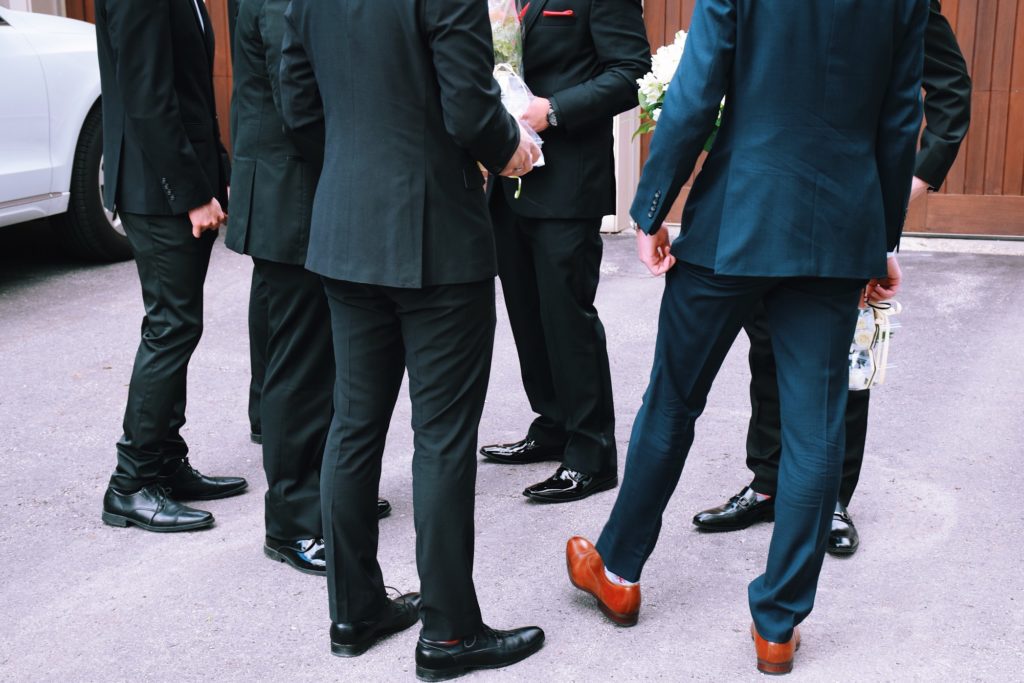Research shows that the more women succeed, the less likable they become. What is it about likability that absolutely seems to elude women leaders? And why does likability even matter? In fact, what does likability even mean? The new phrase summarizing the dilemma faced by women who already have or are seeking positions of authority is “the Likability Trap.” Name a senior woman leader in an important field of endeavor who is routinely described as likable. Anyone? Anybody? Can a strong woman ever be deemed likable?
can a strong woman ever be deemed likable?
We recently read a provocative story in the Sunday New York Times called The ‘Likability’ Trap. In it, Claire Bond Porter, a history professor in Manhattan, traces the origin of the concept of likability. Then she wonders aloud why not a single one of the six women currently running for the Democratic nomination for President has ever been described in the press as “likable.”
The focus of Porter’s article is the political realm. But here at Power Up, we’ve been mulling the issue of female likability and its implications in the business world. Whether in a corporate or entrepreneurial environment, likability is a tangible asset – a form of social capital – with significant value.
So why does it seem to be totally unavailable to women in positions of authority? Said another way: Can a confident, capable, and strong woman ever be deemed likable? Or has the likability trap been set in such a way that evading it is impossible?

what does likability even mean?
What does it mean, why should it matter, and is likability even relevant in the context of business leadership? Excellent questions, dear reader.
it’s a bit difficult to define – but apparently people know it when they see it
Like so many elements of personality and leadership, “likable” is a bit tough to pin down with a crisp definition. We have commonly agreed-upon metrics to determine who is hard-working. Who is intelligent. Even who is honest. But how do you define who is “likable?”
Sure, on its face the word implies a person who is easy to be with – fun to be with, really. A person “you’d want to have a beer with.” Synonyms for likable include easy-going, a good guy, affable, amiable, jocular, avuncular, funny. You know. Someone to shoot the breeze with. Someone comfortable in their own skin. One of us.
does likability really matter?
It turns out that elevating likability from the realm of the personal to a significant qualification for a leadership role in public life is a relatively recent development.
In her article, Porter shares the little-known history of likability. Perhaps unsurprisingly, the concept rose to prominence in the realm of commerce, business, and making money. Likability emerged as an important personality trait in the late 19th century, when “it became closely associated with male business success.”
Being successful meant projecting likability – it became a proxy for virtue, character, and trustworthiness. Civic leaders portrayed themselves as men who were well-liked by their peers. Horatio Alger and Dale Carnegie promoted it as a way to signal one’s character – which in turn would lead to prosperity. “I Like Ike” was a big part of what got the chilly General Dwight Eisenhower into the White House (note the imperative that he use a diminutive version of his name in order to signal his likability).
Porter’s pithy summary on the history of likability is perfect: “It was invented by men for men. Guess who benefits?”

is likability an unequivocally positive attribute?
It’s worth asking: relevant or not, is likability actually a desirable personal characteristic? Because we’ve noticed that “likable” tends to go hand-in-hand with some other character traits – and they’re arguably not what one seeks in a senior business leader. Especially when the stakes are high and there are tough decisions to be made.
Based on our experience, here are some personal traits we’ve observed about men who are deemed likable (because we have never, ever heard a woman described that way, although we have heard men of all races described as such).
the dark side of likability
Likable guys often exhibit a tendency toward goofiness. They frequently demonstrate malleability – they’re somewhat more easily influenced than others. Often, they seem to have a bit less backbone than their peers.
When women demonstrate these exact same behaviors, they are often described as “too eager to please,” or “a little young,” or lacking sufficient conviction – all of which are bad things.
We’ve observed that the likable guy is never the smartest guy in the room. Nor is he necessarily the alpha male. His opinions are not so strongly held that he won’t yield to the group’s wishes. Usually, the likable guy presents no visceral threat to anyone – he’s good looking, but not too much. His hair may be a bit tousled, or his shirt is a little wrinkled. He rarely shows up perfectly coiffed and attired as a Master of the Universe. But that just makes him more endearing. He is often late for meetings. He can keep up with the conversation, but he’s not dazzlingly smart. He’s humorous, but not witty. A little dopey, but a really good time on a long trip.
In short? Being likable means having visible flaws – minor ones, but clearly apparent to all. It requires being deemed vulnerable or even lacking in some way. People who are likable are non-threatening. And maybe just a little less intelligent than you.

Why is it so hard for a strong woman to be deemed likable?
Having been called “unlikable” ourselves on more than one occasion, we have mulled this and many other questions many times over several years.
the workplace as high school
We have to say, you haven’t really lived until you’ve been told that “people don’t like you” when you’re a fully functional fully grown professional adult. You might think that after leaving high school, no one will ever be able to make you feel as if you’re a social outcast. That you’re not cool enough. Not likable enough. Not Homecoming Queen material.
You’d be wrong. Some elements of high school are apparently forever.
the need to project invincibility and conviction
Could it be that women who present as strong, confident and capable are somehow viewed as threatening? Is it possible that getting into a position of authority – especially when you’re not like the ones who have come before you – requires an iron will and a show of strength at all times, no matter what you’re feeling inside?
Perhaps women have been conditioned to believe that if they’re not perfect, they’ll immediately be expelled from the ranks of the powerful? Might that cause them to be unwilling to appear vulnerable? Would that possibly reduce their willingness to be self-effacing, and a bit of a goof in a professional setting? Will the only woman in the room be taken seriously if her hair isn’t combed? How about if she’s chronically late?
the difficulty of projecting authority in a co-ed environment
The pressure put on women to be amiable, obedient, task-oriented and selfless at work, home, and in the public sphere never abates, no matter how much experience and authority we have. This has to be a partial explanation for the resurgence of women-only private clubs and professional networks. Who’s capable of being deferential and self-sacrificing 24/7? At least at the clubhouse, badassery is not only tolerated, it’s encouraged. And your fellow club members will surely do their best to help you free yourself when your foot (and your career) inevitably get caught in The Likability Trap.

is this likely to change anytime soon?
Can a strong woman ever be deemed likable? Here are some possible reasons why we think that appears to be highly unlikely for the foreseeable future.
1. Because gaining authority as an “other” and “outsider” still requires behaviors that are the opposite of likable.
Generally, breaking barriers and being “the first woman” or “the only woman” at the table where the decisions are getting made requires high intelligence, incredibly hard work, critical thinking, emotional intelligence, tirelessness, resilience, charm, and sheer force of will. None of these things translate as likable.

2. Because likability implies a certain dopiness that women of power are still not allowed to exhibit.
Ever. Never. Ever.
3. Because categorizing someone as unlikable is hurtful. And because it works.
At its most basic level, the concept of being likable – or its deadly converse, being unlikable – is a stick with which to cudgel women who either hold or aspire to hold powerful positions. It lands on the person being described as unlikable as a deeply personal condemnation.
It’s like being called “pretty.” Except in reverse. Meaning, it’s an external judgement, totally subjective, but rendered as if from on high as a final judgement and the last word on the topic. Because once someone has said you’re unlikable, where can the conversation go? How could you ever possibly prove your accuser wrong? Certainly not by arguing back. Or even calmly making the case for why it’s not true. Because that would just be further proof of your unlikability.

See why it’s called The Likability Trap? Because like a roach motel, the state of unlikability is a very easy place at which to arrive. And from which it’s nearly impossible to leave.
Like many phrases that seem on their face to be without malice, this one has the power to wound very deeply. It preys on our secret fears from the earliest part of our lives: do they like me? If they don’t like me, why not? What am I doing wrong?
If you set out to inhibit women’s progress, shake their confidence, and call their very core sense of themselves and their worth into question, this would be an excellent way to do it.

what does this mean for women of authority, or those seeking it? and for the people around them?
If we may, for a moment, speak on behalf of Unlikable Women everywhere, we’d like to offer a few suggestions.
First, a few words for the ranks of The Unlikable
We sincerely suggest that you not let being called unlikable stop you from your mission, whatever that mission may be. Don’t fall for the likability trap. Can a strong woman be deemed likable? Maybe. Is being likable essential for your success? Nope.
Lots of other things are mission-critical for your success: like being honest, being trustworthy, delivering on your commitments, seeing things clearly, and getting stuff done. Earning trust, as we noted in a previous post, requires showing vulnerability. But that’s different than being “likable.”
Being vulnerable is a serious matter – you get to decide what to disclose, and when, and to whom, in a thoughtful manner in the workplace. Being likable at work, though? For women, that can be a recipe for a bunch of superficial, submissive, and faintly ridiculous moves – like fake-smiling a lot. Laughing at jokes that aren’t funny. Acting less intelligent than you really are. That’s a horrible way to get through the day.
This fall, Harper Collins is publishing The Likability Trap: How to Break Free and Own Your Worth by Alicia Menendez.
We’re curious to see what she has to say. All we’ll say for now to you, The Unlikable, is just remember: don’t ever do anything to become likable that will cause you to like yourself even a little bit less. It’s not worth it.

Second, some brief messages for everyone else
1. Just stop it.
Just. Stop. It. It’s time to retire this out-dated and unhelpful caricature of likable guys and shrewish women. We’re tired of trying to dodge The Likability Trap. There is really serious work to be done in the world – problems to solve, companies to build, people to help. You’re draining our energy and we don’t want to play anymore. We don’t care whether you like us or not. We don’t want to have a beer with you. Frankly, we don’t even like beer! We care about whether fair and serious-minded people view us as capable, and smart, and a force with which to be reckoned. When you’re ready to engage in a serious discussion about getting something important done, call us.
And by the way, here are a few things that we’d like you to know the next time you start talking about how likable we are (or not). We are many things: creative, smart, insecure, ambitious, striving, exhausted, and more. Daughters, sisters, wives, mothers, friends, and leaders. We have many dimensions.
We are human. And measuring us against a standard that is ill-defined and largely irrelevant is just wrong. The next time you see someone else do it, you should step in and make them stop and think about what they’re really trying to say, and why.

2. Hold us accountable for behaviors and personal traits that matter
We’re totally fine with being called out on the things we do that are not constructive, that are wrong, that are self-centered or otherwise boorish. We understand that we need to show you our humanity in authentic ways if we expect you to trust us. We’ve made mistakes, and we’ll surely make some more. In no way are we perfect. But we’d appreciate it if you would kindly hold us to the same standards that you do our male peers. No more, and no less.
3. walk a mile in our shoes
When you shake your head and say “I don’t know how to describe it, but she’s just unlikable,” could you maybe think about how you would feel if someone said that about you? How it might make you feel diminished, hopeless, despairing, and angry? Trapped, even? Perhaps it might result in defensiveness, or a lack of confidence, or even a diminution in your performance. It might make you want to just give up and go home. Can a strong woman ever be likable? Well, can you name 5 strong women on the public stage who are? If you can’t, then ask yourself why.
4. talk about likability in context
Finally, if you insist on persisting in judging likability as a vital leadership trait, be really specific about context. Because surely, unlikable is a contextual adjective – one can be extremely well-liked, even revered, by one group. And viewed as “unlikable” by another.

Let’s resolve to spring the Likability Trap
Can strong women be likable? Dear reader, we think that’s asking the wrong question. In fact, maybe its time to consign likability in business discourse to the scrap heap of history, along with so many other words that don’t merit continued usage. Let’s be the generation that puts an end to The Likability Trap. Come on, people. We’re better than this.
see luxury in a new light
Come and join our community! For a weekly round-up of insider ideas and information on the world of luxury, sign up for our Dandelion Chandelier Sunday Read here. And see luxury in a new light.
ready to power up?
For a weekly dose of career insights, inspiration and advice, sign up for our Power Up newsletter here.







